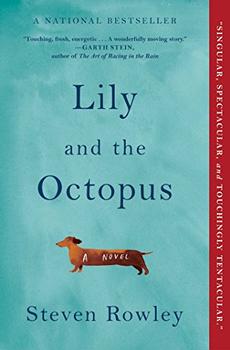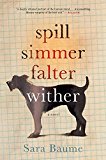Summary | Excerpt | Reviews | Beyond the book | Read-Alikes | Genres & Themes | Author Bio

A Novel
by Eva HornungThe relationship between the nature of the beast and the nature of man is certainly not new to the world of literature. From the ancient mythology of Rome's founding brothers Romulus and Remus, to the adventures of Mowgli in Rudyard Kipling's The Jungle Book and the keen animal perspective in Jack London's classics The Call of the Wild and White Fang, both positive and negative aspects of human nature have been called into question with fascinating imagination.
In her most recent novel, Dog Boy, Eva Hornung rekindles our curiosity with the subject and tells the story of Romochka, a four-year-old boy who is abandoned by both his mother and uncle in the wake of great economic upheaval in Russia in the late 1990's. She effectively grabs the reader's attention with the opening scene in which Romochka sits quietly on the bed and stares at the front door, waiting for it to open, waiting for his family to rescue him from the increasing cold and darkness that closes in around him… but no one comes. There is an eerie, apocalyptic feel to Romochka's situation, and the way he wavers between following his absent mother's advice (Don't talk to strangers... You die if you eat food out of smashed glass...) and doing what he needs to survive creates a vulnerable uncertainty in his character that is truly intriguing.
However, as the novel develops, Romochka's conscious thoughts and feelings, which are supplied by the omniscient narrator, often seem too self-aware and deliberate for a four-year-old in such a situation. And while Hornung does give readers technical and even logical reasons for why everything happens in the novel, there isn't a thorough enough exploration of the complexity of human emotion that results from our actions. Consequently, Romochka's character (along with other human personalities in the novel) feels over-simplified, his role overly prepared to serve a predetermined purpose in the novel, as opposed to being an organic, complex and emotionally honest being. This produces a slight mistrust between the narrator and the reader and limits the book's ability to explore the nature of humanity (what is inherent, what is learned, what is civilized, what is savage) to its fullest extent. In this way, the philosophical questions concerning human nature that direct the third section of the novel, though absolutely interesting, do not connect with readers as well as they might have.
Nonetheless, Dog Boy finds its strength in Hornung's attention to descriptive detail, and images such as the "frozen puddles here and there [that give] a dull gleam, wrinkled like the eyes of dead fish" or Romochka's tiny thumb that had at one point been sucked to "its perfect shape" or the intricate knowledge of Moscow's metro system stay with the reader and create bursts of literary delight. In particular, the deep affection depicted between Romochka and his canine family is created in the nuzzles, growls and subtle animal behaviors that humans often overlook.
The ending of the novel is strong as well; Hornung delicately weaves a thread of modernity (and the complexities that it brings) into the age-old questions about human nature, and it seems a shame that the book ends shortly after it hits its stride.
![]() This review
first ran in the May 5, 2010
issue of BookBrowse Recommends.
This review
first ran in the May 5, 2010
issue of BookBrowse Recommends.

If you liked Dog Boy, try these:

by Steven Rowley
Published 2017
Combining the emotional depth of The Art of Racing in the Rain with the magical spirit of The Life of Pi, Lily and the Octopus is an epic adventure of the heart.

by Sara Baume
Published 2017
A debut novel already praised as "unbearably poignant and beautifully told" (Eimear McBride) this captivating story follows - over the course of four seasons - a misfit man who adopts a misfit dog.
Your guide toexceptional books
BookBrowse seeks out and recommends the best in contemporary fiction and nonfiction—books that not only engage and entertain but also deepen our understanding of ourselves and the world around us.